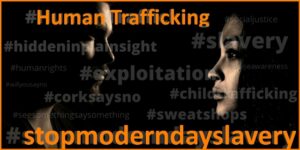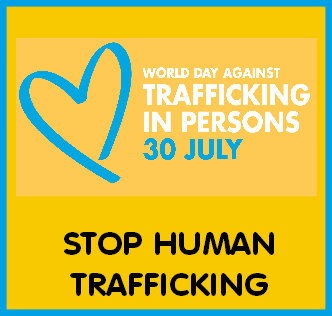The UN designated “World Day Against Trafficking” in Persons, marked on the 30th of July each year, highlights the fact that globally more than 40 million people are trapped in human trafficking. This can take many forms including forced labour, sex trafficking and domestic servitude. In Ireland, documented cases include human trafficking for sexual exploitation, labour exploitation, domestic work, forced begging, forced criminality and forced marriage.
FACTS ABOUT TRAFFICKING
|
|---|
Trafficking in persons is a crime and a grave violation of human rights. Sadly, it is increasing throughout the world.
This year’s World Day Against Trafficking in Persons, with the theme “Reach every victim of trafficking, leave no one behind,” aims to raise awareness of disturbing developments and trends identified by the United Nations Office on Drugs and Crime (UNODC). According to its website, global crises, conflicts, and the climate emergency are escalating trafficking risks, leaving more people vulnerable to exploitation by traffickers. In addition, national responses, particularly in developing States, appear to be deteriorating. Detection rates and convictions are falling, illustrating a worldwide slowdown in the criminal justice response to trafficking. COVID-19 also changed the characteristics of trafficking, pushing it further underground and potentially increasing the dangers to victims by making the crime less likely to come to the attention of the authorities. 41% of victims who manage to escape their ordeal reach out to the authorities on their own initiative – a clear sign that anti-trafficking responses are falling short. “Leave no one behind”- the theme for this year’s World Day against Human Trafficking is also the central, transformative promise of Agenda 2030 and its Sustainable Development Goals (SDGs).
In the context of trafficking in persons, leaving people behind means:
- failing to end the exploitation of trafficking victims,
- failing to support victim-survivors once they are free from their traffickers, and
- leaving identifiable groups vulnerable to traffickers.
According to the UN, “To end human trafficking, we cannot allow this crime to be met with increasing indifference and impunity. We must strengthen resilience against exploitation and the underlying socio-economic and cultural issues that are conducive to trafficking. We must sensitize everyone to the topic of human trafficking and thus push attention towards those who can make a difference in terms of changing policy and national resource management to strengthen prevention measures, improve identification of victims, increase support of survivors and end impunity.” (Source: https://www.unodc.org/unodc/en/endht/index.html)
Ireland and Human Trafficking.
One of the most authoritative international sources of information about Human Trafficking is the annual Trafficking in Persons (TIP) Report. Researched and published by the US State Department the Report ranks the response of countries around the world to Human Trafficking within their borders on three levels: Tier 1. Countries whose governments fully meet the minimum standards specified by the US Trafficking Victims Protection Act (TVPA); Tier 2. Countries whose governments do not fully meet TVPA minimum standards but are making significant efforts to do so; Tier 3. Countries whose governments do not fully comply with TVPA minimum standards and are not making efforts to do so.
This year’s TIP Report contains an extensive section reflecting the current reality of Human Trafficking in Ireland and our Government’s response. To access this click here.
In Summary, the 2023 TIP report points out that systematic deficiencies in combatting human trafficking remain in Ireland. Therefore, for the second year running this means; “The Government of Ireland does not fully meet the minimum standards for the elimination of trafficking but is making significant efforts to do so…..therefore Ireland remained on Tier 2” (TIP Report 2023).
While there were some positives (in terms of funding for victim care and awareness, making people in the fishing industry less vulnerable, assisting victims and in identifying ‘several’ child victims) the report is critical in key areas: “The government did not convict any traffickers – a decrease compared with the prior year – and has never convicted a trafficker for labour trafficking. Chronic and systemic deficiencies in victim identification, referral, and assistance persisted; and services for victims remained inadequate.”
In addition, the Report is also critical that “the government did not adopt an updated National Action Plan, amend its NRM, (National Referral Mechanism) or overhaul its accommodation framework for trafficking victims, which continued to leave victims with inadequate and unsuitable accommodations. Additionally, the government identified fewer trafficking victims among vulnerable groups, specifically sea fishers, and decreased investigations of trafficking crimes.” The report goes on to make 14 recommendations to improve the State’s response, which, if implemented in the coming year, would allow Ireland to be categorised as Tier One in the 2024 TIP Report.
Commenting on this year’s TIP Report, Edel McGinley, Director of the Migrants Rights Centre Ireland (MRC) said, ‘Progress on human trafficking in the State is too slow. We continue to wait for new National Referral Mechanism legislation to be completed. The Government approved a proposal for a new Referral Mechanism (NRM) in 2021 – this would make it easier for trafficking victims to come forward and receive supports. It would also make it easier for the State to provide that support and protection in a collaborative way across the range of departments and agencies, and working with key NGOs. However the mechanism is still not in place.” *
 At present, in Ireland only the Garda can identify a person as a victim of trafficking thus making the protections of the NRM available to them. NGO’s or Human Rights organisations cannot refer the victims they support through the NRM while victims themselves, who often fear police, will not approach the Garda and therefore cannot access the support they need. The right to identify victims of Human Trafficking needs to be extended to NGOs. Commenting further the MRCI Director said, “There is no reason why Ireland should not be on Tier 1. We need an effective National Referral Mechanism (NRM) urgently. In particular, incoming legislation for a new NRM must include the rights and entitlements of victims, such as a secure immigration status, so that people feel supported and
At present, in Ireland only the Garda can identify a person as a victim of trafficking thus making the protections of the NRM available to them. NGO’s or Human Rights organisations cannot refer the victims they support through the NRM while victims themselves, who often fear police, will not approach the Garda and therefore cannot access the support they need. The right to identify victims of Human Trafficking needs to be extended to NGOs. Commenting further the MRCI Director said, “There is no reason why Ireland should not be on Tier 1. We need an effective National Referral Mechanism (NRM) urgently. In particular, incoming legislation for a new NRM must include the rights and entitlements of victims, such as a secure immigration status, so that people feel supported and
protected to come forward and report this terrible crime’.*
*Source:https://www.mrci.ie/2023/06/16/media-release-tip-report-shows-systemic-deficiencies-in-combatting-human-trafficking-remain/


You must be logged in to post a comment.